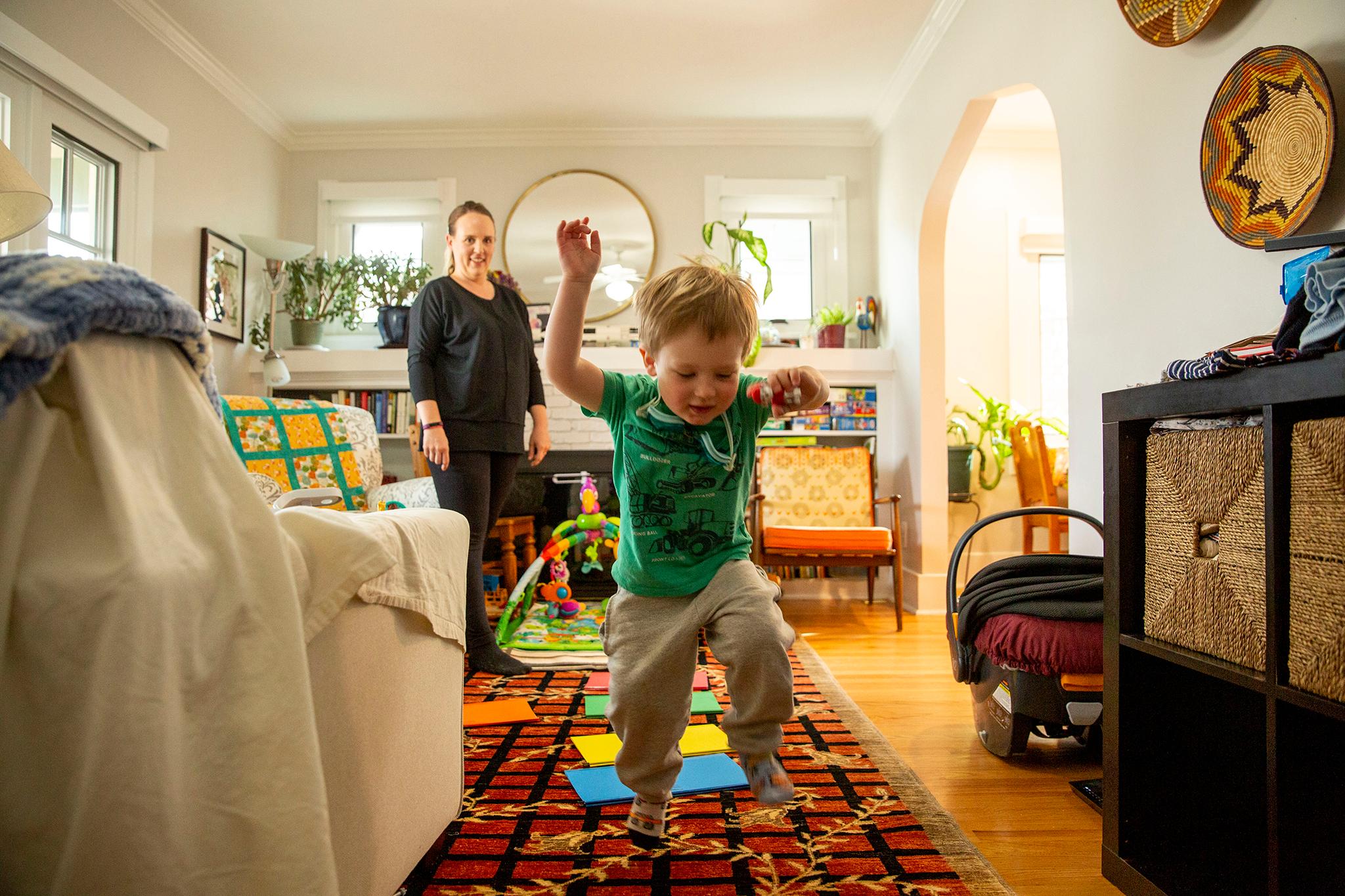A pregnancy book Jessica Tribbett read recommended parents start looking for a childcare center when a fetus reaches five months.
"I was like, 'That is ridiculous, and I'm not doing that,'" she recalled. "And I wish I had."
Her daughter came five weeks early. When her child was three months old, Tribbett started looking for childcare.
"We started looking at infant rooms and then quickly realized that the waitlists for infant rooms were too long," Tribbett said. "So our mothers kindly agreed to continue to help for about a year, and we also brought on a nanny for two days a week to give our mothers a break. Even though they're retired, it's kind of a lot to hang out with a baby all day."
In all, she applied to six childcare centers in Denver and spent $500 in application fees that her family will never get back.
Tribbett is hardly alone. Parents across Denver and across the income spectrum are struggling to find quality childcare they can afford in an increasingly unaffordable city.
As of 2020, Denver had 42,766 children under the age of 5, according to the 2020-2021 report from Denver's Early Childhood Council. There were just 515 licensed childcare centers to serve those kids.
The situation is even bleaker statewide. Around 60% of childcare centers in Colorado report that is it difficult to retain staff, forcing some places to shut down entire classes and others to close altogether, according to a January report from the Bell Policy Center.
For years, the industry has depended on paying teachers less than they are worth -- close to minimum wage, said Liliana Flores Amaro, who teaches early childhood education at the University of Colorado Denver and has worked in the field since 2010. She blames the struggles childcare centers face on inadequate pay for teachers.
But she said many parents can't afford to pay more in tuition to increase teacher pay. She said the government needs to step in to help.
The state is behind in what it needs to do to make childcare more accessible, according to the Bell Policy Center. Colorado is facing $500 million in unmet funding needs starting in 2023, and if childcare providers were paid living wages, that would go up to $1.17 billion.
Parents often use "daycare center" as a universal term for places that watch infants and very young children. That irks early-childhood educators, who say it makes them sound like babysitters. They prefer terms like childcare center or at-home childcare. Then there's the ubiquitous preschool -- a term that usually covers education for 3 or 4 year olds.
"Early childhood [education] is very complex," said Kelly Bowes, director of career pathways at Denver's Early Childhood Council. "Whereas the K-12 education system has more of a dedicated funding stream and the brick-and-mortar schools that we all are familiar with, in early childhood, things are more fragmented."
Public funding for preschools is typically more abundant than it is for early-childhood centers. The state legislature passed universal preschool for children ages 4 year and older starting in 2023. The program covers 10 hours a week of childcare. Headstart programs often provide excellent early education for children who qualify, but eligible families must make $23,030 or less.
Voters approved the publicly funded Denver Preschool Program, which offers universal preschool tuition credits to all 4 year olds and serves 60% of that population. The program is also piloting a program for 3 year olds and helps connect families to childcare centers.
But for working parents of children 0 to 2 who are not eligible for public support, what are they supposed to do with their children while at work? Not everybody has friends, family and neighbors to rely on, and some new parents have little community at all.
Denverite spoke with parents, early-childhood educators, advocates and child-care center directors, who all agreed: Working families are struggling to find and pay for quality childcare.
Even if they can afford tuition, the care itself is often unreliable, leaving young parents scrambling to meet their commitments at work and keep their children alive and healthy. All of this has worsened during the pandemic. Shortly after COVID-19 came to Denver, childcare centers shut down and 10% never reopened, according to the Bell Policy Center report.
Finding a quality child-care center with immediate availability is challenging. Parents scour Google and Colorado Shines, the organization that rates the quality of childcare centers across the state. The best-reviewed programs are often full, and so are the mediocre ones. Many home-childcare centers that are not licensed aren't taking new kids. Peruse any local parent Facebook page and it's clear that even nannies are booked.
"People are filling out their waitlists while trying to conceive," said Chelsea Ransom, who lost her job during the pandemic and moved to Denver with her newborn in the summer of 2020.
Her job in environmental engineering was on a hiring freeze, and staying at home with the baby was fine at first. Then she got a new job, and for a while, no child-care centers were available. She's grateful her employee worked with her and her husband's schedules.
"I was really fortunate that my job had like ultimate flexibility to work on nights and weekends, which is what I spent most of my nights and weekends doing," she said. Because she worked for the federal government, she was given priority on a waitlist at a federal childcare center, and her kid got in reasonably quickly.
Then she and her family had a second child and moved across town to a larger home.
"There just aren't really any daycares anywhere near us that accept infants zero to one year," she said.
The one that does, the Goddard School, has no openings until August 2023, according to a letter from the school.
"For an infant, that is absolutely absurd, because you would have to be thinking about getting pregnant now," Ransom said.
New mom Fiona Jeter found luck after applying to more than a dozen childcare centers.
Just before the pandemic, "I started my search just by looking for daycare centers on Google," she said. "I think I probably applied to like, I don't know, 15 schools and did all the tours and got on waitlists and everything."
Even after some centers reopened, many families pulled their children. That meant there was a spot for Jeter's baby -- despite a shrinking number of centers.
"We only got into one," Jeter said, noting that things are worse now than then. "I think they're just all really packed in, so it's competitive and hard to get in. I know I have some friends who are pregnant now and looking, and they say that waitlists are like two to three years out."
New mom Aya Takemoto, who moved from New York City to Denver during the pandemic, said she was surprised by how few childcare options there were in town.
She had looked for childcare in New York and found it to be more expensive than in Colorado, but also more available.
"In Denver, I feel like you can do your due diligence, and you can get on as many waitlists as you want, and there is no guarantee that you are going to get a spot -- particularly for newborn care," she said. "Most places will tell you that even if they do have a newborn room, those rooms get taken up by siblings of students in their toddler room. And so like everywhere you call, they'll tell you, 'Oh, you're expecting a baby? Well, you can probably get a spot in 18 months to two years.' Which is not that helpful."
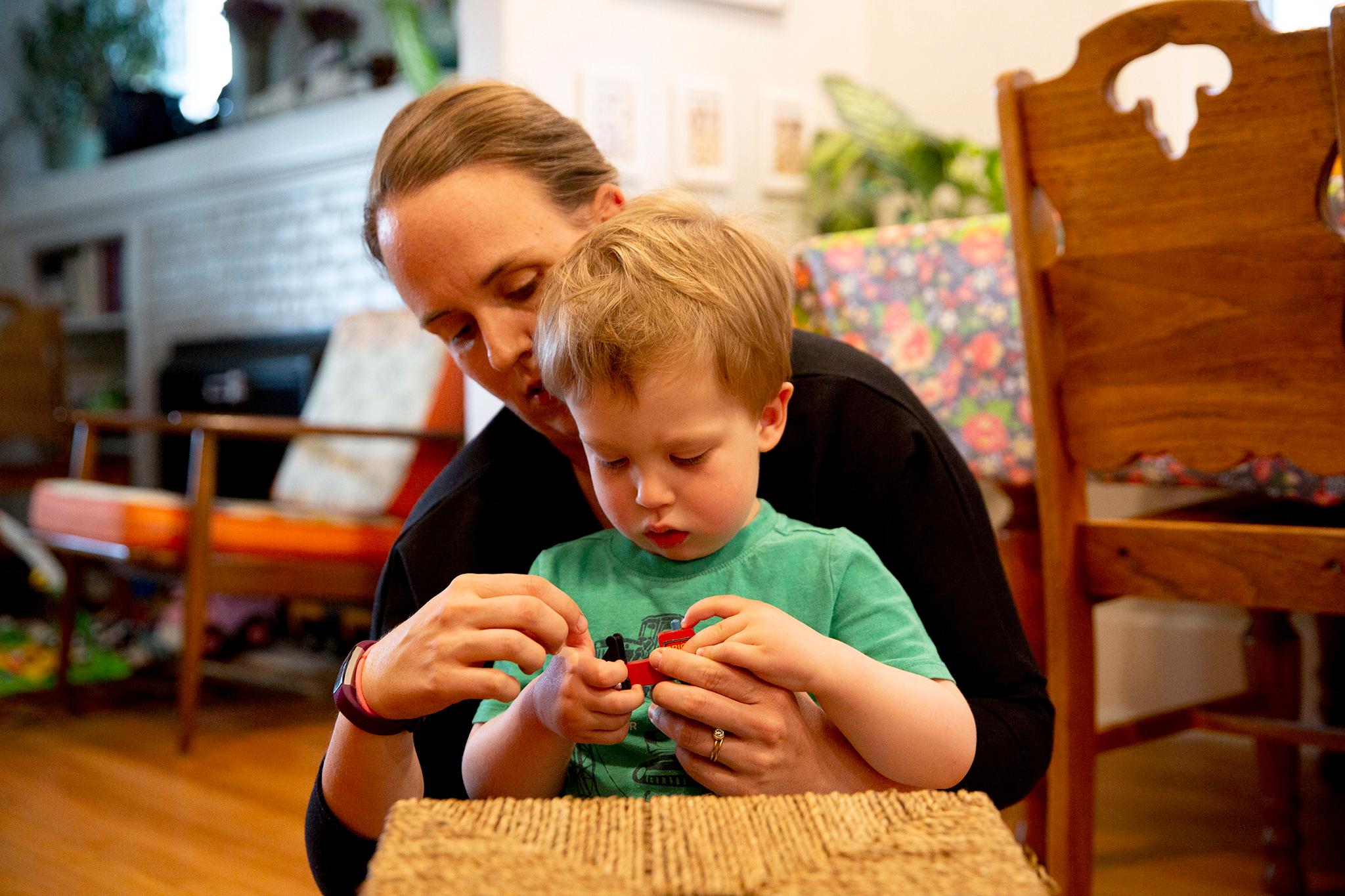
Beatrice Scheuermann filled out a cumbersome application and ponied up $195 to get her six-month-old on a waitlist at a prestigious Denver Montessori school in August 2019.
She writes grants for a Washington, D.C., nonprofit and is used to slogging through questionnaires. But even she found the childcare center's application requirements challenging to address.
"You have to tell them why you think Montessori is for them, what your future is for your kids, how you do Montessori in your home, your parenting philosophy," she recalled, noting the application process was as complicated as applying for foundation money. "With a six-month-old first kid, I was like, I don't know. I'm just trying to keep him alive. What do I know?"
Going on three years, she said, "My kid still hasn't got a spot."
Not that the center hasn't followed up.
"They reach out to me every December, very nicely," she said. "And they're like, 'Do you want to stay on our waitlist?' But he still has not been offered a spot. Which just is maddening to me, because that's so much money for them to take to not get anything in return."
After getting on two other waitlists -- $50 each -- her child got a spot at another center.
"I guess we've managed to find really good care that we feel really great about," Scheuermann said. "But it's not without lots of knocking on doors and lots of teeth-gnashing."
With her East Coast salary, Scheuermann is making more than her colleagues in the Denver nonprofit sector. But even she said it's a stretch to pay for childcare and the city's exorbitant housing prices.
"I've looked at doing my job in Denver, and the salaries are like 30% to 40% less," Scheuermann said. "I don't know how people will afford daycare on Denver salaries."
For most parents lucky enough to get their children into a childcare center, the costs are burdensome -- even for those making well over the median income.
The U.S. Department of Health and Human Services considers families cost-burdened by childcare if it costs more than 7% of their monthly income. Most Colorado families are spending between 16% and 27% of their income on childcare, according to the Bell Policy Center. Colorado is in the top ten least affordable states for child care. Center-based infant care costs 44% more than tuition for a year at a public college, according to the report.
"The cost is pretty high," said Elsa Holguín, head of the Denver Preschool Program. "The average in Denver is $14,000 a year. And that's for preschool. As you go to the younger children, it gets even more expensive."
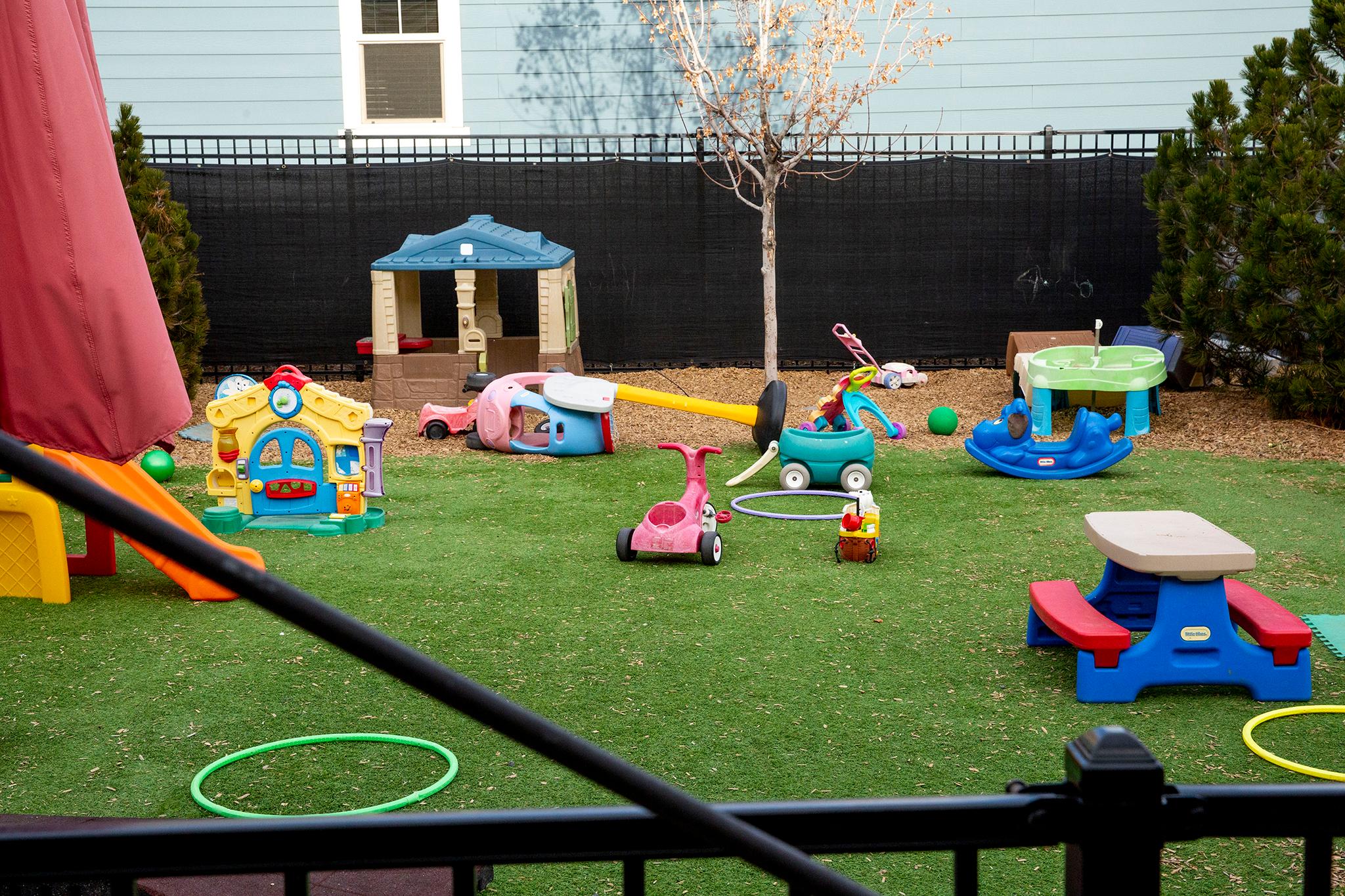
Parents' struggles are being compounded by the state of the childcare industry, which has long operated on thin profit margins and relied on charging high tuition and paying staff low wages to stay afloat. Early childhood educators are fleeing their jobs for more lucrative lines of work.
"There is a shortage of workers," Holguín said. "Just like all the other industries, we don't have enough people. So we do hear from some of our providers that they have less classrooms available, because they don't have enough teachers. In many cases, the administrators have to be in the classroom, because they have to meet the number of adults to children who have to be there. And so it's become really challenging to both hire and retain teachers in early childhood, particularly because they're not very well paid."
Despite how critical these educators are to a functioning society, Bowes said, they leave the field for jobs that pay a livable wage and offer good benefits.
"How do we keep them staying in the field when there are other industries who have their signs out for hiring now, get paid today?" she said. "Other industries -- I think about retail, and food, hospitality -- have increased a lot of their benefits and other supports like that. And the child-care industry's been more challenged to be able to do that."
Early-childhood educators report being overworked and disrespected by families. That coupled with low wages and few benefits has forced many to leave the field.
All of this is increasing wait times and, ultimately, access to childcare centers.
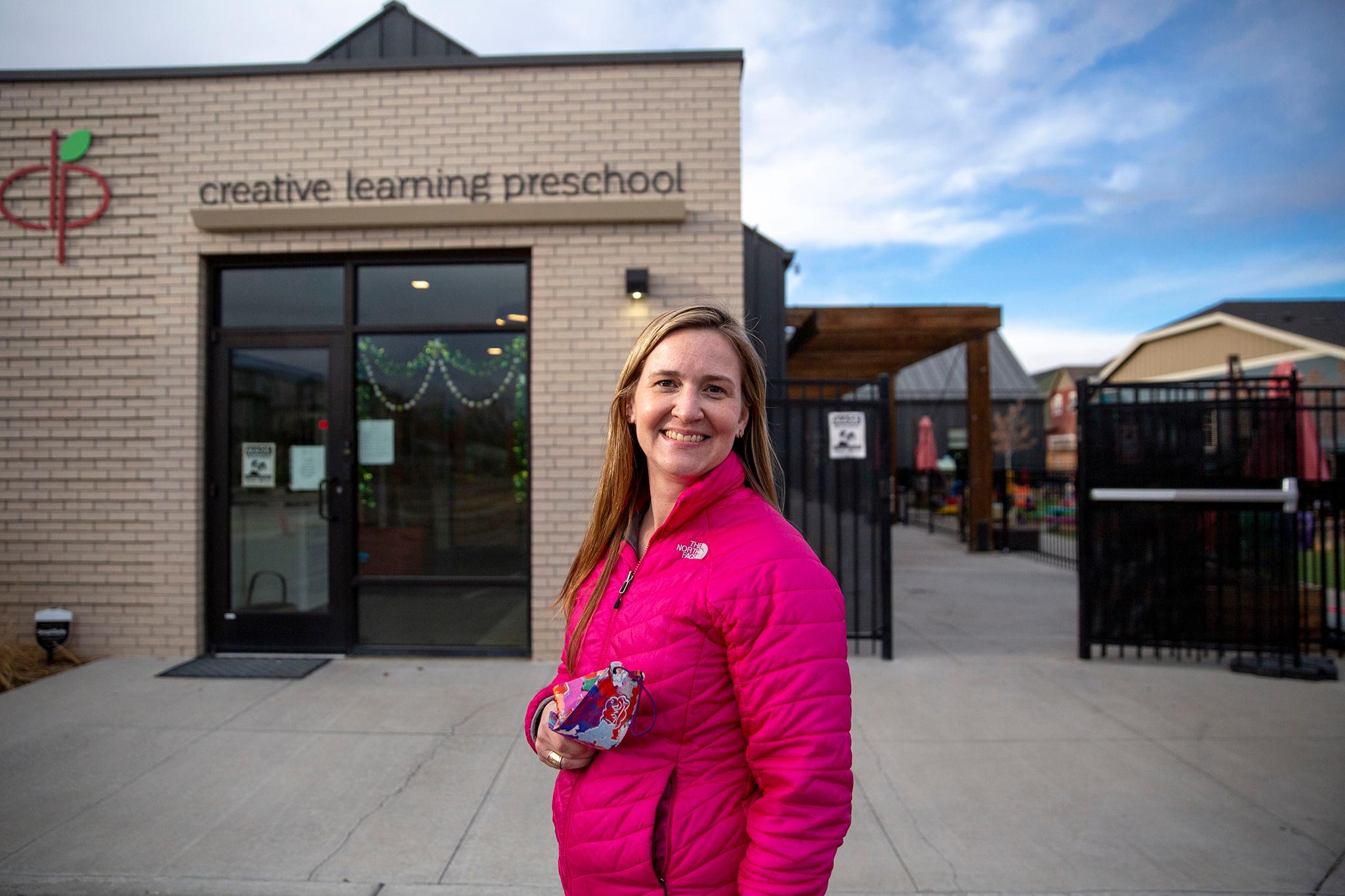
Pam Melot, the executive director of the Creative Learning Preschool, said she's proud of the popularity of her school. The long waitlist shows that the families who go there are happy and promoting it. But she's also concerned that demand for programs like hers is only growing, and the sector can't keep up.
Most years, her program, on the Aurora and Central Park border, has had a 25% attrition rate. This year it's been more like 5%.
"A lot of our families since the pandemic haven't moved away from the Denver area," she said. "They've stuck around. There's more and more people moving here from the San Francisco area. I get a lot in Chicago for some reason."
Those families often have high expectations about care that can't be met because there aren't enough spaces in classrooms.
"That also means that the families that don't have a very good situation, or maybe don't have a very safe situation - it's a neighbor that probably shouldn't be watching their child -- don't have the option of getting into a program like mine," she said. "Because none of my families are leaving."
So what do working parents who can't find or afford a child-care center do?
Around 40% of Colorado families rely on relatives, friends and neighbors to watch their children, according to the Bell Policy Center. Sometimes those caretakers are skilled and competent; other times, they are the only option available.
"My dad helps out on his days off of work during the week, and then my mom helps another two and a half days of the week," said Amaro, who has one child. "There are definitely times of the week where I don't have coverage. So I just have to figure out my schedule and work evenings or nights or early mornings to try and get everything that I need done."
When Kelly and Ben Findley's childcare center closes because of an illness -- lately that's been a lot of COVID-19 -- they work from home and care for their infant. They have flexible jobs.
"We can figure out with balance, and divide and conquer where needed. So we've been able to power through," Ben said. "It's certainly been trying, and we have those weeks. I sympathize for other people that don't have that same flexibility or, or financial flexibility."
Sylvia Johnston, a single mother who runs an accounting business, said when she can't secure childcare, she has brought her child into online meetings or canceled them outright, sometimes losing her clients. Happily, many of the businesses she works with have been understanding about her need to prioritize her son.
"He had that stomach flu last week," she said. "He actually was on a Zoom call with me. They were doulas, so they take care of babies. And I had to end the call because he had to go and throw up, and I said, 'Sorry, you guys. It's puking time.'"
Even before her son was in daycare, Johnston hired nannies, though finding a reliable one during the pandemic has been tough. She has gone through four.
People moving to Denver have a unique set of problems.
Transplants who left their homes elsewhere to raise families in Denver often do not have social networks they can tap for care.
"A lot of people are transplants, so a lot of them don't have family," Scheuermann said. "Everyone wants to move here and be independent. I've definitely had a bunch of friends who left because of the lack of childcare and lack of social support here."
"I think there are tons of young families moving here," Takemoto said. "And so there are a lot of young families who are having babies, but the newborn daycare supply hasn't caught up."
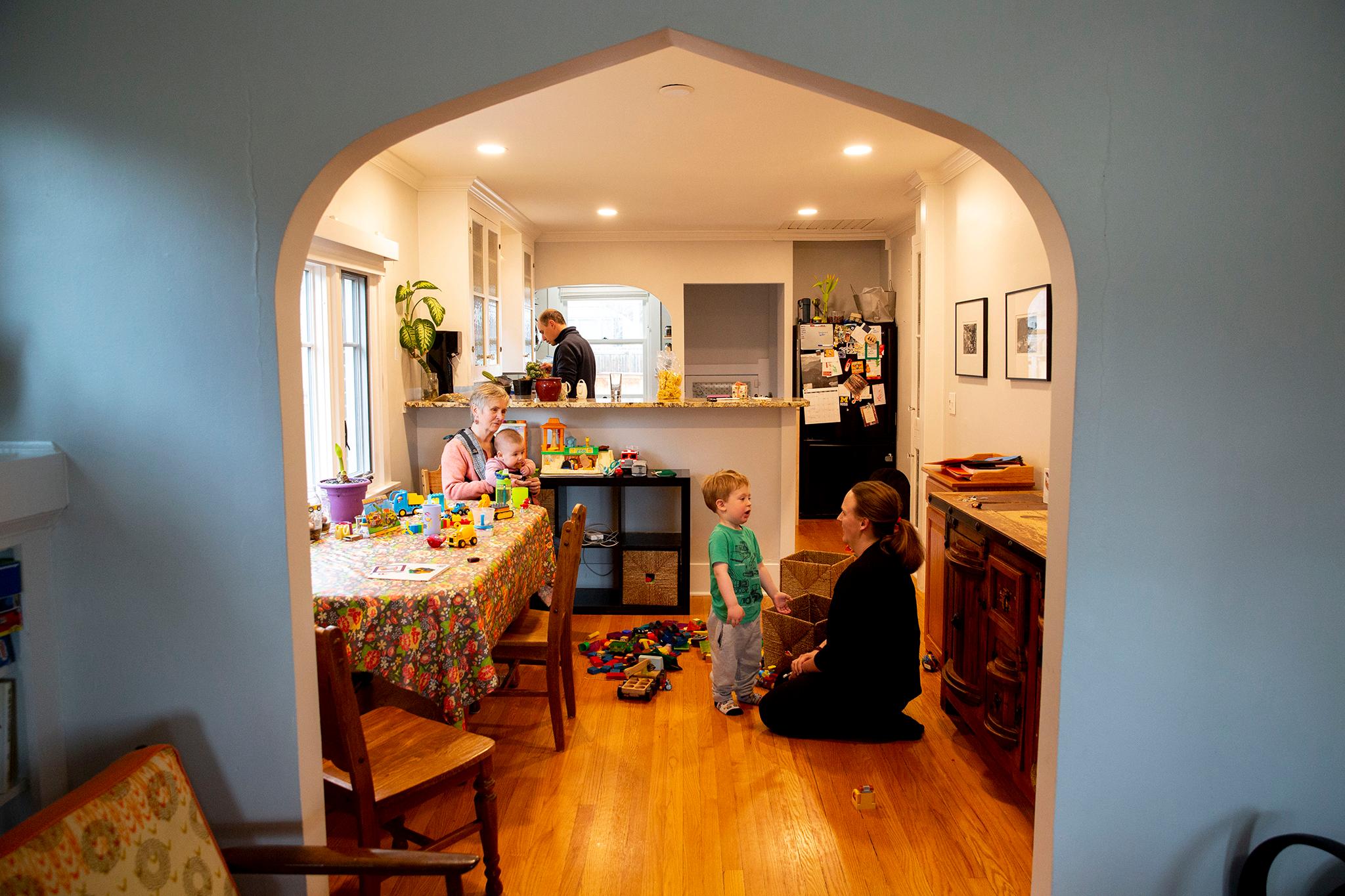
Unlike K-12 education -- think public schools -- the burden of paying for early-childhood education falls largely on families.
Only 28% of parents in Colorado receive some sort of public support, from funders like the Colorado Child Care Assistance Program, the Colorado Preschool Program and Preschool Special Education. Black and Indigenous families have less access to childcare centers than white families, according to the Bell Policy Center.
Liliana Flores Amaro and her husband, a trucker, own their home in Swansea, which they bought in 2009. They pay $1,600 on the mortgage each month. The couple has a two year old and plenty of support in their neighborhood.
"Our families are here," she said. "My mother in law is, like, eight blocks away. My mom and dad are less than 10 minutes away from here. That's what makes it really, really nice. My sister in law lives across from my mother in law. There's a good network of support here."
She's exploring part-time care, which would cost $1,300 a month.
"It's like another mortgage payment for part-time toddler care," Amaro said. "My husband and I are blessed to be able to try and imagine how to manage that extra payment. But it's gonna be a stretch, by any sense of the word, to have to stack another mortgage payment on top of our monthly bills."
Elsa Holguín, head of the Denver Preschool Program, has some hope that solutions may be coming.
The state created the Department of Early Childhood, which will administer the universal pre-K funds. Holguín is optimistic the federal government might fund universal preschool, too. The Build Back Better Act, which passed the House but failed in the Senate, included $400 billion in funding for childcare and universal pre-K. President Joe Biden promoted funding childcare and preschool at the State of the Union.
"One of the silver linings of the pandemic is that people understood how important it is to fund and support childcare, because families cannot go to work unless they have access to child care," she said. "It's an economic investment that we have to make in order to help the family."
She envies countries like Italy, Spain and France that have universal, publicly funded preschool and where enrollment is 90%. Stateside, there hasn't been the political will to pay for infants and toddlers.
"The business of early childhood education is a very imperfect market in that it is not ready," Holguín said. "It requires a lot of investment in support to be able to have it ready. And so we do a poor job as a country to be able to support it."
Over the next few weeks, Denverite will be exploring the state of childcare in Denver. Do you have stories you want to share? If so, write me at [email protected].
Explore the series
Denver's broken childcare system forced this single mom to declare bankruptcy
This early-childhood educator couldn't afford childcare for her six-year-old. Why keep teaching?
Here's what being 'super, super, super lucky' looks like in Denver's childcare crisis

